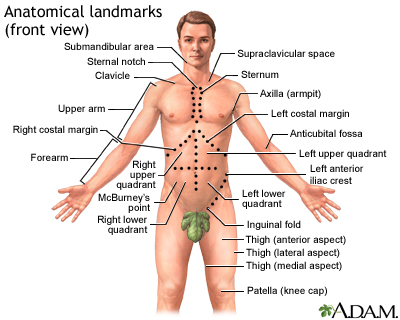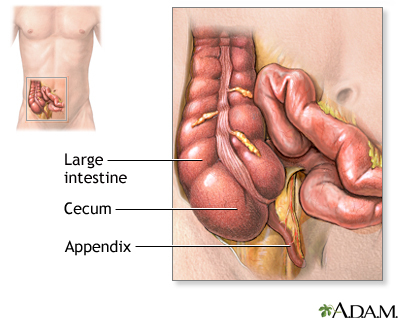UF Health North’s First Birthday
March 22, 2016
On Saturday, March 19, 2016, we celebrated the first birthday of UF Health North. I wrote a newsletter about UF Health North about a month after we opened our…
UF Health Jacksonville, +1 more
Update your location to show providers, locations, and services closest to you.
Appendicitis is a condition in which your appendix gets inflamed. The appendix is a small pouch attached to the large intestine.

Appendicitis is a very common cause of emergency surgery. The problem most often occurs when the appendix becomes blocked by feces, a foreign object, a tumor or a parasite in rare cases.
The symptoms of appendicitis can vary. It can be hard to detect appendicitis in young children, older people, and women of childbearing age.
The first symptom is often pain around the belly button or mid upper abdomen. Pain may be minor at first, but becomes more sharp and severe. You may also have a loss of appetite, nausea, vomiting, and a low-grade fever.
The pain tends to move into the right lower part of your belly. The pain tends to focus at a spot directly above the appendix called McBurney point. This most often occurs 12 to 24 hours after the illness starts.
Your pain may be worse when you walk, cough, or make sudden movements. Later symptoms include:
Your health care provider may suspect appendicitis based on the symptoms you describe.
Your provider will do a physical exam.
A blood test will often show a high white blood cell count. Imaging tests that may help diagnose appendicitis include:
Most of the time, a surgeon will remove your appendix as soon as you are diagnosed.
If a CT scan shows that you have an abscess, you may be treated with antibiotics first. You will have your appendix removed after the infection and swelling have gone away.
The tests used to diagnose appendicitis are not perfect. As a result, the operation may show that your appendix is normal. In that case, the surgeon will remove your appendix and explore the rest of your abdomen for other causes of your pain.
Most people recover quickly after surgery if the appendix is removed before it ruptures.
If your appendix ruptures before surgery, recovery may take longer. You are also more likely to develop problems, such as:
Call your provider if you have pain in the lower-right portion of your belly, or other symptoms of appendicitis.




Cole MA, Huang RD. Acute appendicitis. In: Walls RM, Hockberger RS, Gausche-Hill M, eds. Rosen's Emergency Medicine: Concepts and Clinical Practice. 9th ed. Philadelphia, PA: Elsevier; 2018:chap 83.
Rosenthal MD, Sarosi GA. Appendicitis. In: Feldman M, Friedman LS, Brandt LJ, eds. Sleisenger and Fordtran's Gastrointestinal and Liver Disease: Pathophysiology/Diagnosis/Management. 11th ed. Philadelphia, PA: Elsevier; 2021:chap 120.
Sifri CD, Madoff LC. Appendicitis. In: Bennett JE, Dolin R, Blaser MJ, eds. Mandell, Douglas, and Bennett's Principles and Practice of Infectious Diseases. 9th ed. Philadelphia, PA: Elsevier; 2020:chap 78.
Smith MP, Katz DS, Lalani T, et al. ACR appropriateness criteria right lower quadrant pain -- suspected appendicitis. Ultrasound Q. 2015;31(2):85-91. PMID: 25364964 pubmed.ncbi.nlm.nih.gov/25364964/.
March 22, 2016
On Saturday, March 19, 2016, we celebrated the first birthday of UF Health North. I wrote a newsletter about UF Health North about a month after we opened our…
UF Health Jacksonville, +1 more
The appendix...